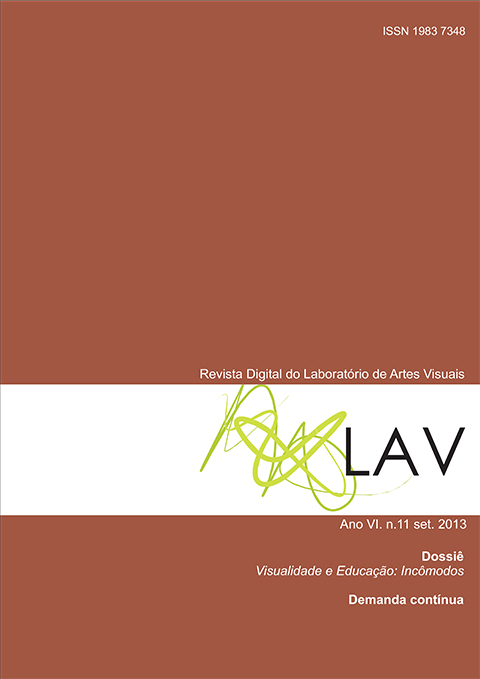The re-enchantment of school: an ethico-aesthetic paradigm in education
DOI:
https://doi.org/10.5902/198373488995Keywords:
School, Ethico-aesthetic paradigm, Creation, TransformationsAbstract
The present article analyzes the School institution through an ethico-aesthetic paradigm via its creative processes. It aims at problematizing how this paradigm can change the School institutional limits and its means of subjectivation. We consider that the School is built, simultaneously, by an organization plane which maintains forms and striations, as well as a consistency plane which composes the smooth mutable spaces. The focus of this article will be on the consistency plane, since it hosts the creative processes and the changing possibilities. To conceive an education that is concerned with changes is a political statement – a policy of change – based on a type of ethics which can only be conceived along with aesthetics once we consider that ethical construction is formed by the aesthetic attitudes that each educational experience requires. In short, we intend to transgress clichés of representation about the School as an instituted place lacking transformation. We crave to extract from this hardened-School calcified by striations, its flows, transformations and multiplicities.Downloads
References
CANGUILLEM, G. O normal e o patológico. Rio de Janeiro: Forense, 1982.
CALVINO, Í. As cidades invisíveis. São Paulo: Cia das Letras, 1990.
DELEUZE, G. Nietzsche. Lisboa, Portugual: Edições 70, 1965.
_______, G. Conversações 1972 - 1990. Rio de Janeiro: Editora 34, 1992.
_______, G. Crítica e Clínica. São Paulo: Editora 34, 1997.
_______, G. Francis Bacon: lógica de la sensación. Madrid: Arena Libros, 2002.
DELEUZE, G. Et GUATTARI, F. O que é filosofia? Rio de Janeiro: Editora 34, 1992.
_______, G. Et GUATTARI, F. Mil platôs – capitalismo e esquizofrenia. Rio de Janeiro: Ed.34, vol. 3, 1996.
_______, G. Et GUATTARI, F. Mil platôs – capitalismo e esquizofrenia. São Paulo: Ed.34, vol. 4, 1997a.
_______, G. Et GUATTARI, F. Mil platôs – capitalismo e esquizofrenia. São Paulo: Ed.34, vol. 5, 1997b.
DELEUZE, G. Et PARNET, C. Diálogos. São Paulo: Editora Escuta, 1998.
DIAS, R. M. Nietzsche educador. São Paulo: Ed. Scipione, 1991.
EMERSON, C. Os cem primeiros anos de Mikhail Bakhtin. Rio de Janeiro: DIFEL, 2003.
FOUCAULT, M. A verdade e as formas jurídicas. Rio de Janeiro: Nau, 1996.
GALLO, S. Deleuze e a Educação. Belo Horizonte: Autêntica, 2003.
OLIVEIRA, A. M. Um Olhar Sobre O Invisível: o duplo cognição e criação no territórioEscola. Dissertação Mestrado em Psicologia Social e Instituicional. Porto Alegre: PSICO – UFRGS, 2006a.
OLIVEIRA, A. M., FONSECA, T. G. Os devires do território-escola: trajetos, agenciamentos e suas múltiplas paisagens. In: Educação e Realidade, vol. 31, jul/dez 2006b, p. 135-154.
NIETZSCHE, F. Estética y teoría de las artes. Madri: Editorial Tecnos, 2001.
__________, F. Escritos sobre educação. São Paulo: Ed. Loyola, 2003.






